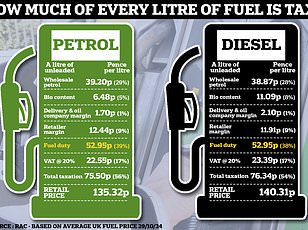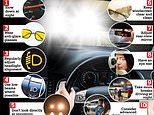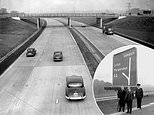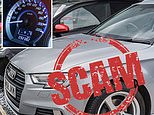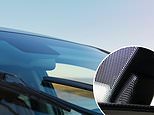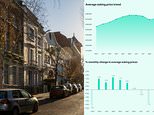Chancellor's stealth tax on new petrol and diesel cars: First-year VED rates to DOUBLE next year to as much as £5,490
- Even a relatively efficient new petrol family car will cost £540 to tax next year
- Autumn Budget: Rachel Reeves's big changes and what they mean for you
Rachel Reeves will introduce a stealth tax on new petrol and diesel cars from next year that will see buyers stung with road tax costs of up to almost £5,500.
During her Budget statement, the Chancellor said the Government will change Vehicle Excise Duty first year rates for new cars registered after 1 April 2025 to 'strengthen incentives to purchase zero emission and electric cars, by widening the differentials between zero emission, hybrid and internal combustion engine cars'.
However, the Budget document confirms that Ms Reeves will try to force drivers to choose greener vehicles by not only guaranteeing low first-year VED rates for EVs but by doubling them for all cars emitting more than 76g/km CO2.
One expert labelled it as a 'shove, not a nudge' towards an electric car future.
With every traditional petrol and diesel car on sale having higher emissions than this, it means buyers face hiked first-year road tax costs of between £270 and a staggering £5,490.

The Budget document reveals that Rachel Reeves will DOUBLE first-year VED rates for new petrol and diesel models, meaning road tax costs as high as £5,490 for the most-polluting models
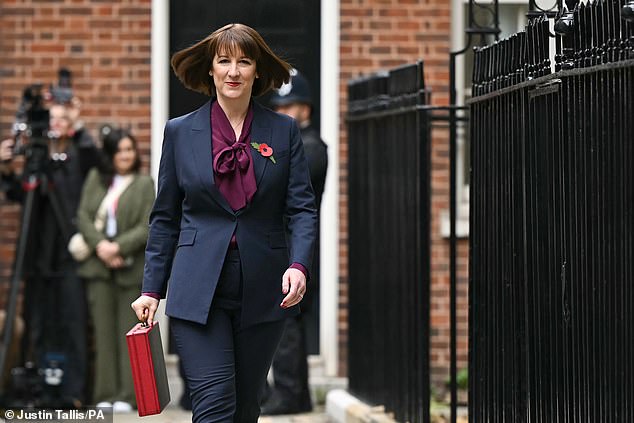
The Chancellor said the government will change VED first year rates to 'strengthen incentives to purchase zero emission and electric cars, by widening the differentials between zero emission, hybrid and internal combustion engine cars'
The Budget document reveals that all zero-emission electric cars will pay the lowest first-year tax rate - commonly referred to as the 'showroom tax' - of just £10.
This will be retained until 2029-30 to incentivise drivers to switch to greener cars, with the Labour government standing by its manifesto promise to ban the sale of new petrol and diesels in 2030.
To also encourage motorists to buy hybrid models in the interim, new examples with emissions between 1 and 50g/km CO2 (which is achieved only by plug-in hybrid models) next year will be subject to £110 first-year VED rates.
For plug-in hybrids emitting between 51 and 75g/km CO2, the showroom tax in 2025-26 will be £130.
But in a blatant move to discourage drivers from buying new petrol and diesel cars, the current first-year VED rates applied to these vehicles will be doubled.
As such, this will see buyers incur huge costs, particularly those purchasing large family models and especially anyone purchasing heavy, gas-guzzling SUVs and supercars.
'All other rates for cars emitting 76g/km of CO2 and above will double from their current level for 2025-26,' the document states.
The lowest first-year VED rate for petrols and diesel with emissions of 76-90g/km currently rings in at £135 today.
However, from 1 April, this will double to £270.
Even most small conventional 'self-charging' hybrid vehicles have CO2 emissions above this threshold.
Toyota's Yaris hybrid, even in its least-polluting specification, puts out 91g/km CO2 and therefore will be stung with the double tax rise, increasing from £165 if you buy a new one today to £330 if you were to order one after 1 April 2025.

Even small conventional hybrid cars will be stung by first-year tax rate increases. A Toyota Yaris hybrid, considered one of the greenest superminis on the market, can't escape - buyers of new models from 1 April will have to pay £330 for VED in the first year, up from £165 currently
| Emissions (g/km) CO2 | 2024-25 first-year VED rate | 2025-26 first-year VED rate |
|---|---|---|
| 0* | £0 | £10 |
| 1-50** | £10 | £110 |
| 51-75** | £30 | £130 |
| 76-90 | £135 | £270 |
| 91-100 | £175 | £350 |
| 101-110 | £195 | £390 |
| 111-130 | £220 | £440 |
| 131-150 | £270 | £540 |
| 151-170 | £680 | £1,360 |
| 171-190 | £1,095 | £2,190 |
| 191-225 | £1,650 | £3,300 |
| 226-255 | £2,340 | £4,680 |
| Over 255 | £2,745 | £5,490 |
| *only EVs **only plug-in hybrids | ||
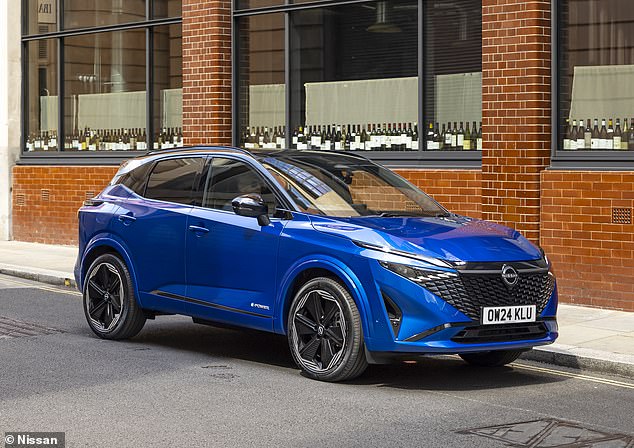
Families buying a modest Nissan Qashqai with a 1.3-litre mild hybrid petrol engine will incur first year VED costs of £540 from 1 April
Even the most frugal and economical new cars with 'mild-hybrid' (offering a little electric assistance without sending any e-power to the wheels) internal combustion engines emitting between 101-110g/km C02 will suffer the first-year road tax hike, riding to £390 from £195 previously.
A family buying a brand new 1.3-litre mild-hybrid petrol Nissan Qashqai (which emits 144g/km of CO2) would have to pay an extra £540 (up from £270) in the first year under the new rules.
Yet the biggest sting will be for buyers of the most polluting vehicles.
Any petrol or diesel car with emissions of 191-225g/km CO2 will be upped to £3,300 (from £1,650) for the first year. This would include a new mild-hybrid diesel Range Rover, which has claimed CO2 emissions of 194g/km.
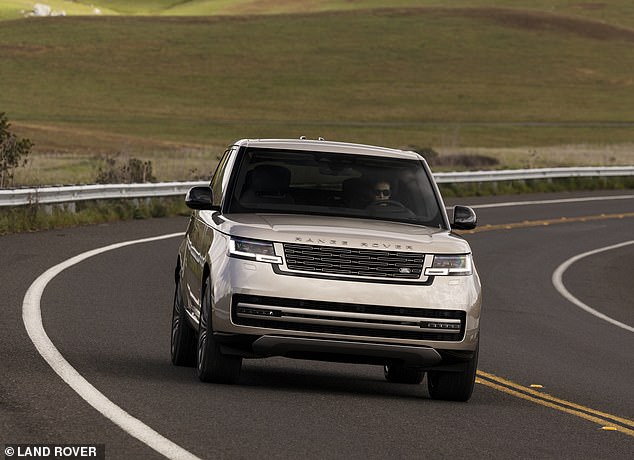
Buyers of a mild-hybrid diesel Range Rover that emits 194g/km CO2 will be hit with a showroom tax cost of £3,300
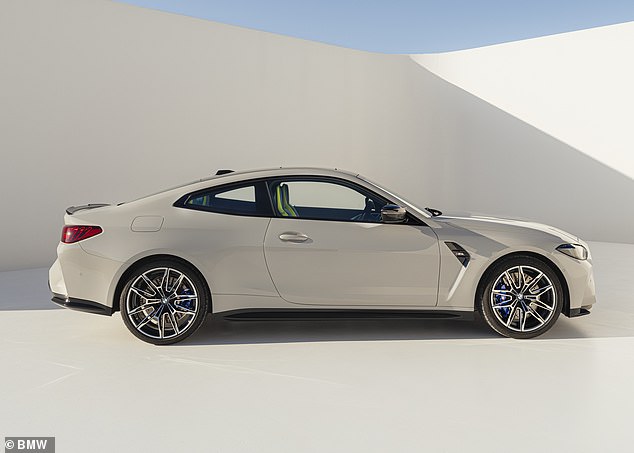
Performance cars will be stung very hard by the tax changes. A BMW M4 - which emits between 226 and 230g/km CO2 - will cost £4,680 to tax for the first year

The biggest first-year VED rates are for the most polluting new petrol and diesel cars that emit over 255g/km CO2, like the Lamborghini Urus super-SUV. Buyers from 1 April will be charged a staggering £5,490 just in road tax for the first 12 months
The initial VED costs for a brand new vehicle putting out 226-255g/km CO2 will be hiked to £4,680 (from £2,340). This would hook cars like BMW's latest M4 performance coupe, which emits between 226 and 230g/km CO2.
The biggest increase will be for motorists purchasing new petrol and diesel cars with CO2 emissions in excess of 255g/km, which for the first year only will cost a staggering £5,490 (up from £2,745). This will be incurred by a number of supercars as well as Lamborghini's super-SUV, the Urus.
Changes to VED will raise £400million for the Treasury, Reeves told MPs during her statement.
From a car's second year, all models will be subject to a standard rate of VED, which currently stands at £190 for petrols and diesels and £180 for hybrids. EVs are also expected to be subject to a lower standard rate from next year.
Steve Gooding, director of the RAC Foundation, described the move as 'less of a nudge and more of a shove to change buyer behaviour in the showroom'.
He said while it might appear to be an effective way of incentivising buyers to go electric, it could simply see drivers keep their older, more polluting cars for longer.
Nicholas Lyes, IAM RoadSmart director of policy and standards, said that increasing VED on all but zero emission vehicles in the first year will 'hit those buying new conventional vehicles in the pocket'.
He added: 'A better solution to incentivise the take-up of electric vehicles would have been to cut VAT on the sale of new electric vehicles with list price of £40,000 and under.'
Also commenting on the stealth tax on new petrol and diesel cars, Paul Barker, editor at car magazine Auto Express, said: 'Doubling first-year VED rates for anything over 76g/km alongside big hikes for non-EVs below that adds a notable cost, especially for high-polluting cars over 255g/km that will now cost almost £5,500 in first-year VED alone.'







